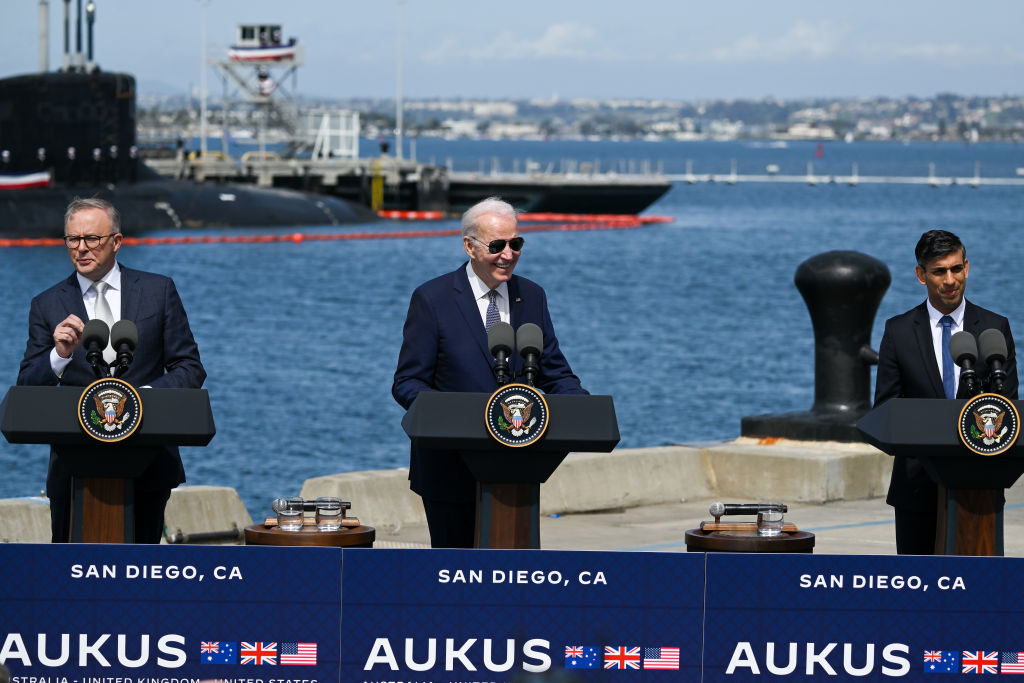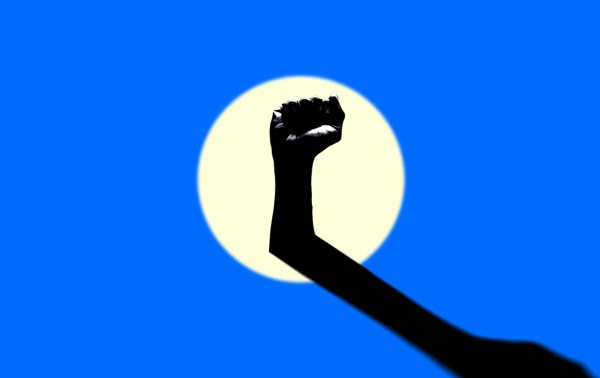Happy Thursday! If you—like Declan—have not yet filled out your bracket for the TMD March Madness pool, you only have a few more hours until the first (non-play-in) games tip off!
More than 1,600 of your fellow readers have already signed up for a chance to win a lifetime membership, Yeti tumblers, Dispatch merch, and more. To enter, click here (you will need to have a free ESPN account) and select “Join Group.” The password is “TMD2K23!” and if you want to be eligible for prizes, fill out this form so we can connect you with your ESPN entry.
Quick Hits: Today’s Top Stories
- Credit Suisse announced this morning it will borrow up to 50 billion Swiss francs ($53.7 billion) from the Swiss National Bank in an effort to shore up liquidity after Credit Suisse’s stock price plunged to an all-time low on Wednesday. The U.S. Treasury Department has reportedly begun reviewing American banks’ exposure to Credit Suisse amid the turmoil, which was sparked in part by the collapse of Silicon Valley Bank and in part by Credit Suisse’s largest shareholder announcing it would not buy any more stock in the bank due to regulatory concerns.
- The Labor Department reported Wednesday the producer price index (PPI)—a measure of what suppliers and wholesalers are charging customers—rose 4.6 percent year-over-year in February, down from January’s 5.7 percent annual rate and the measure’s lowest reading since March 2021. Core PPI—which excludes food and energy prices—held steady at a 4.4 percent annual rate in February. The Commerce Department, meanwhile, reported Wednesday that retail sales—including spending on food and fuel—declined 0.4 percent month-over-month in February after climbing 3.2 percent in January.
- Secretary of State Antony Blinken announced Wednesday during a trip to Ethiopia the United States would provide the war-torn African nation with another $331 million in humanitarian assistance aimed at supporting “those displaced and affected by conflict, drought, and food insecurity.” Blinken urged Ethiopian leaders to follow through on the fragile peace agreement both sides of the civil war agreed to in November and called for “accountability” for the hundreds of thousands killed over the past few years.
- An Iranian police spokesman announced yesterday law enforcement had arrested 110 suspects in connection with the suspected poisoning of thousands of schoolgirls in the country in recent months. The official didn’t provide details about any of the suspects’ alleged motives or say whether police had determined what chemicals were used in the attacks, but claimed a number of cases were the result of “psychological factors” rather than poisoning.
- The Justice Department announced yesterday it had arrested Chinese billionaire Guo Wengui after unsealing a 12-count indictment that included several wire fraud, securities fraud, bank fraud, and money laundering charges. Guo—an associate of Steve Bannon—is alleged to have defrauded thousands of his online followers out of more than $1 billion, misappropriating their money to fund his lavish lifestyle. The government has seized $634 million from 21 different bank accounts over the past few months, and seized a Lamborghini Aventador SVJ Roadster from Guo on Wednesday.
- President Joe Biden signed an executive order on Tuesday aimed at expanding background checks for gun purchases, directing the attorney general to “clarify” the definition of a firearm seller “to move the U.S. as close to universal background checks as possible without additional legislation.” Despite this billing, the president has limited executive authority to expand background checks beyond the scope of current laws. The order also directs various federal agencies to “encourage effective use” of red-flag laws and produce a report on how the federal government can better support the “recovery, mental health, and other needs” of individuals and communities affected by gun violence.
- The Environmental Protection Agency announced this week it was proposing a new rule that would limit the amount of per- and polyfluoroalkyl substances—or “forever chemicals”—permitted in the country’s drinking water. The rule, if finalized, would require utilities to tighten their water filtration systems for chemicals that were used in Scotchguard and Teflon for decades and are linked to cancer and reproductive problems. The EPA projects the upgrades would cost nearly $800 million annually, but industry groups have argued that’s a significant underestimate.
- The Surface Transportation Board announced Wednesday it had approved a proposed merger between Canadian Pacific Railway and Kansas City Southern—the largest such transaction in more than two decades. Canadian Pacific Railway and Kansas City Southern were the sixth- and seventh-largest freight carriers in North America—and the combined entity will still be the smallest of the six remaining “major” railroads—but the consolidation comes at a time of heightened scrutiny for the industry after several high-profile derailments.

Between another nationwide strike resulting in thousands of tons of trash stacking up on the streets of Paris and three so-called allies unveiling a deal that cost the country more than $40 billion, France is having a pretty tough week. Après la pluie, le beau temps.
The United States, the United Kingdom, and Australia announced on Monday the first major development of their trilateral partnership known as AUKUS: the planned sale of nuclear-powered (not nuclear-armed) U.S.-made submarines to Australia. The three countries also announced a program to boost nuclear submarine construction over the next several decades, train Australian soldiers at American and British submarine bases, and deploy U.S. and U.K. subs to a military base on Australia’s west coast. That may sound like a lot of hullabaloo over a few submarines, but the announcements mark a significant strategic milestone as the three countries look to address rising competition with China in the Indo-Pacific.
“AUKUS has one overriding objective: to enhance stability in the Indo-Pacific amid rapidly shifting global dynamics,” President Biden said Monday in remarks at Point Loma Naval Base in San Diego, alongside Australian Prime Minister Anthony Albanese and British Prime Minister Rishi Sunak. When first announced in 2021, AUKUS was a partnership in search of an action plan. This week’s news reflects the product of an 18-month effort to sketch out a path to boost Australia’s submarine development and strengthen military cooperation between the three countries.
So what exactly is in the deal? The headliner is a promise to sell three American Virginia-class submarines with an option for Australia to purchase two more if necessary. These subs take years to build—the deal lists the delivery date as “early 2030s”—but once ready, they will significantly boost Australia’s naval capabilities. Australia currently relies on a fleet of six older Collins-class submarines that run on diesel and batteries that are slated to age out in the 2030s.
Second, the U.K. and Australia will partner on building a next-generation class of nuclear-powered submarines, the SSN-AUKUS, with the help of U.S. technology. These AUKUS subs will be deployed in both the British and Australian navies, with the first vessels scheduled to be delivered to the British Navy in the late 2030s and the Australian Royal Navy in the early 2040s. All three countries have committed to significantly increasing their industrial capacity to produce additional subs in the coming decades.
Third, the three countries will cooperate on personnel training and strategic deployments to help bring the Australian Navy up to speed on fielding the new subs, with Australian submariners embedding with the U.S. Navy for training as early as this year. And starting in 2027, the U.S. and U.K. will establish a “rotational presence” of nuclear-powered subs docking at Australia’s HMAS Stirling naval base near Perth.
These measures represent the most substantial step Australia has taken in recent years to reassert its sovereignty in the Pacific as relations with China have deteriorated. Although China remains Australia’s number one trading partner—Beijing relies on the island nation for a range of goods including vital materials such as iron ore—the countries’ relationship has grown increasingly tense following a freezing of diplomatic talks and a trade war initiated by China in 2020. While relations with Beijing have begun to warm in recent months with the resumption of diplomatic talks, the AUKUS deal demonstrates Australia’s continued commitment to thwarting Chinese regional aggression.
“The AUKUS agreement we confirm here in San Diego represents the biggest single investment in Australia’s defense capability in all of our history,” Albanese said. He wasn’t exaggerating: Australia will spend up to an estimated $368 billion for the subs over the next three decades.
Because nuclear-powered submarines can run for decades without needing to refuel, the new subs will enable Australia’s navy to traverse farther distances and operate for longer periods of time, capabilities crucial for patrolling sea lanes and monitoring hot spots in the region. “Their economy lives and dies by exports, and to a lesser extent, imports,” John Schaus, a senior fellow at the Center for Strategic International Studies who studies Asia-Pacific security, told The Dispatch. “Freedom of navigation and the ability to protect and patrol sea lanes is very important for Australia.”
“They made the judgment that the submarines they had, diesel electric submarines, weren’t going to provide the kind of distance and weren’t able to support the types of missions that Australia might need to pursue, if it were to continue to protect its interests,” he added.
China took the news about as well as you’d expect, claiming the move violated the 1968 Nuclear Non-Proliferation Treaty (NPT). “The nuclear submarine cooperation plan released today by #AUKUS is a blatant act that constitutes serious nuclear proliferation risks, undermines international non-proliferation system, fuels arms races, and hurts peace and stability in the region,” the Chinese Mission to the United Nations wrote on Twitter Monday.
The NPT treaty contains a loophole allowing non-nuclear countries to utilize nuclear material for naval nuclear power without being subject to International Atomic Energy Agency (IAEA) inspections, but the IAEA has consulted on the AUKUS plans, and IAEA head Rafael Grossi appeared satisfied with the efforts the countries have taken to mitigate any proliferation risks. “All are committed to ensuring the highest non-proliferation and safeguards standards are met,” he said. Australia is a non-nuclear state, and the nuclear fuel to power the submarines will be provided by the U.S. and the U.K. The U.S. has not shared its nuclear-powered submarine technology with another country in 65 years—the last recipient was the U.K.
Aside from the submarines, the AUKUS partnership also includes a second pillar of military cooperation that began last April, focusing on scientific and technological innovation in quantum computing, artificial intelligence and autonomous vehicles, cyber warfare, and hypersonic missile development. Earlier this month, the Defense Intelligence Agency warned China may already have operational hypersonic missiles that could threaten U.S. forces in the Pacific.
Almost as important as the military cooperation itself is what that cooperation makes clear to U.S. adversaries. “One of the important signals that AUKUS sends is that Australia, the United States, and the U.K. are increasingly aligned politically,” Schaus said. “If we believe that China is at least as focused on the political aspects of the global security environment as it is about the defense hardware side, AUKUS is sending a great signal of common purpose and objectives amongst those three countries, and frankly, other countries that are interested in similar types of arrangements.”
Worth Your Time
- In an article for the Free Press, Katherine Dee takes a look at the lives of “human lab rats”—people who make a living subjecting themselves to Phase I trials for risky new drugs. “The lab-rat economy is efficient, streamlined, corporate. The way one joins or is recruited has a certain rhythm,” she notes. “First, there’s the ad. Usually, it’s an emoji-laden message in all caps that you might come across on social media, on a hospital or university bulletin board, on Craigslist, in a forum, or in an invite-only group chat: you—your organism—in exchange for $8,000, $10,000, even $30,000. The ads are usually posted by recruiting companies or fellow lab rats looking for recruiting fees. Second, there’s the prescreening call: confirmation that you, the prospective lab rat, know what you’re getting into. Third, there’s the physical. This takes place at some faceless facility, often in a faceless strip mall. The facilities, as described by lab rats, are usually quiet, sterile, bleach-soaked—a halfway point between a mental institution and a generic office. White walls, fluorescent lighting, linoleum.”
- Nearly 20 years after the start of the Iraq War, Petra Epperlein and Michael Tucker caught up with several veterans of the conflict and put together a short (17-minute) documentary reflecting on their service for the New York Times. “Months after the United States invaded Iraq in 2003, I began filming the U.S. Army’s 2nd Battalion, 3rd Field Artillery Regiment (known as the Gunners) in Baghdad,” Tucker writes. “The unit was housed in a bombed-out palace on the banks of the Tigris that they named Gunner Palace. Rather than just making a movie about the men, I suggested that we make a film together — an offer that the soldiers quickly embraced. They told the story of the war as only they could: They played guitar, spat out rhymes and played to the camera. But behind all their bravado and posturing, they were just kids who desperately wanted the world to understand the war through their eyes.” He visited with some of these men during the pandemic, and “spoke with them about how they make sense of their role in a war that has yet to be fully reckoned with.”
Presented Without Comment
Also Presented Without Comment
Also Also Presented Without Comment
Toeing the Company Line
- In the newsletters: Scott looks at (🔒) what cobalt’s newfound superabundance says about the market’s ability to adapt, the Dispatch Politics team explores the political fault lines of the Silicon Valley Bank collapse, Nick tries to (🔒) define “wokeness,” and Jonah wonders if (🔒) Joe Biden really believes the stories he tells about his own past. “The Democrats will renominate someone who is either a profound and compulsive liar or a fantasist,” he writes. “And there’s a non-trivial chance that candidate will run against Donald Trump, his closest competitor in this regard.”
- On the podcasts: David and Sarah revisit the Stanford Law School story, and Jonah talks to Manhattan Institute senior fellow James Meigs about clean energy, tech policy, and environmentalism.
- On the site: Kevin shares his thoughts on the Silicon Valley Bank failure and Charlotte covers a Chinese-brokered deal that could transform the Middle East’s diplomatic landscape. Plus, Bennett Murray reports from Kramatorsk, Ukraine, on a family-owned aquarium that’s become a symbol of resilience amid Russia’s invasion.
Let Us Know
Do you have any desire to spend time aboard a submarine? How long do you think you could last before the claustrophobia sets in?








Please note that we at The Dispatch hold ourselves, our work, and our commenters to a higher standard than other places on the internet. We welcome comments that foster genuine debate or discussion—including comments critical of us or our work—but responses that include ad hominem attacks on fellow Dispatch members or are intended to stoke fear and anger may be moderated.
With your membership, you only have the ability to comment on The Morning Dispatch articles. Consider upgrading to join the conversation everywhere.